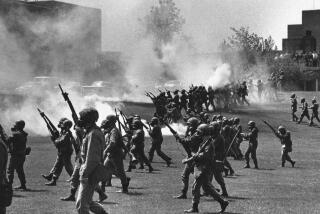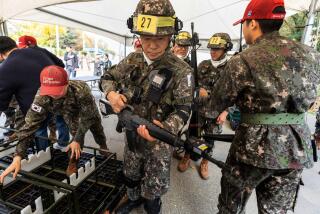A Ghost From an Old War
- Share via
Earlier this year, the Defense Department says, it investigated and dismissed allegations that U.S. soldiers deliberately killed scores or even hundreds of Korean civilians nearly 50 years ago, in the early days of the Korean War. But now the Associated Press, quoting Koreans who say they are survivors of a massacre and Army veterans who say they were present when one took place, has provided enough new information to compel the Army to reopen its investigation.
The alleged incident occurred in late July 1950 at a place called No Gun Ri, about 100 miles southeast of Seoul. At the time, poorly led and inexperienced U.S. and South Korean forces were being pushed back by the North Korean army, which had invaded a month earlier. Large numbers of Korean civilians were fleeing south. Among them, in some cases, were North Korean infiltrators in disguise. Orders had gone out to U.S. forces that no refugees were to be permitted to cross the battle lines. On July 26 a group of civilians fleeing from nearby villages sought refuge close to where elements of the Army’s First Cavalry Division had dug in.
Survivors among those refugees say that at some point they were deliberately fired on, first by U.S. aircraft and later by the soldiers. Some veterans the AP spoke to confirmed there was firing. Whether it occurred under orders or spontaneously and how many civilians might have been killed are in dispute. But the evidence seems strong that something terrible happened that day at No Gun Ri and that U.S. units were in the area.
It won’t be easy for the Army to reconstruct events from 1950. But it has a moral responsibility to undertake what Army Secretary Louis Caldera promises will be an “all-encompassing” inquiry. It should certainly interview the same sources the AP interviewed and anyone else with firsthand knowledge, and it should examine the military records the AP has examined and any others that might shed light. The new reporting on the No Gun Ri incident lends weight to the allegation of an atrocity. If one took place it must be acknowledged, and the survivors should be compensated.
More to Read
Sign up for Essential California
The most important California stories and recommendations in your inbox every morning.
You may occasionally receive promotional content from the Los Angeles Times.













